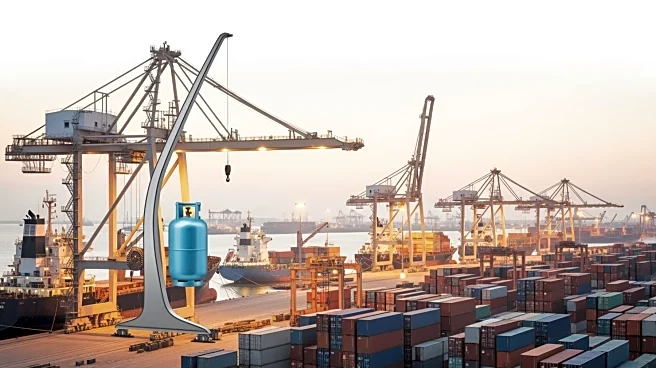What's Happening?
In a recent edition of the MarineLink Podcast, Jim Bunsey, Senior Manager of Business Development at the Propane Education & Research Council (PERC), discussed the advantages of using propane in port operations. The discussion focused on the West Basin
Container Terminal (WBCT) at the Port of Los Angeles, operated by Ports America. For over two decades, WBCT has utilized propane-powered port tractors, significantly reducing fuel costs, emissions, and maintenance expenses. This initiative is part of a broader effort to transition to cleaner energy sources and reduce environmental impact in the maritime industry.
Why It's Important?
The use of propane in port operations is significant as it addresses both economic and environmental concerns. By reducing fuel and maintenance costs, ports can operate more efficiently and sustainably. The reduction in emissions also aligns with global efforts to combat climate change and improve air quality. This transition to cleaner energy sources is crucial for the maritime industry, which is a major contributor to global emissions. The success of propane at WBCT could serve as a model for other ports and industries looking to reduce their carbon footprint and operational costs.
What's Next?
As the maritime industry continues to seek sustainable solutions, the adoption of propane and other alternative fuels is likely to increase. Stakeholders, including port authorities and environmental organizations, may push for broader implementation of such technologies. Future developments could include further innovations in propane technology and expanded use in other sectors of the transportation industry. Monitoring the outcomes at WBCT could provide valuable insights for similar initiatives worldwide.
Beyond the Headlines
The shift towards propane and other alternative fuels in port operations may have broader implications for energy policy and environmental regulations. As industries adopt cleaner technologies, there could be increased pressure on policymakers to support these transitions through incentives or regulations. Additionally, the success of propane in reducing emissions could influence public perception and acceptance of alternative fuels, potentially accelerating their adoption across various sectors.
















